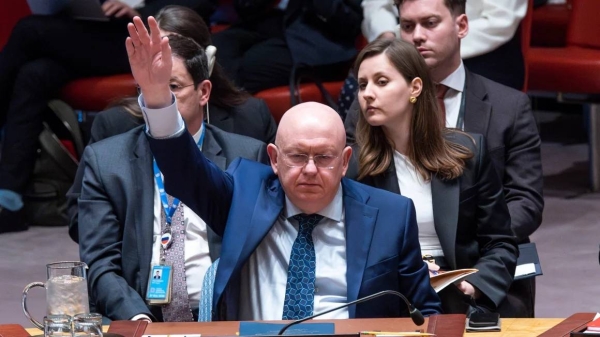
Russia and the United States clashed at the United Nations Security Council on Tuesday after Moscow vetoed a Washington-drafted resolution to set up a panel to identify the perpetrators of toxic gas attacks after chemical weapons were used in the rebel-held town of Douma in Syria’s Eastern Ghouta.
It was the 12th time that Russia has used its veto power at the council to block action targeting its Syrian ally.
The council voted two more times on draft texts put forward by Russia, but both measures failed to garner the nine votes required for adoption, laying bare divisions at the top UN body over Syria.
As the showdown between Russia and the United States got underway, Moscows Ambassador Vassily Nebenzia accused the United States of "planting this resolution" as a "pretext" to justify action against Syria and "taking yet one more step toward confrontation."
"We are using the veto in order to protect international rule of law, peace and security, to make sure that you do not drag the Security Council into your adventures," Nebenzia said.
President Donald Trump has warned that there will be a "big price to pay" for the use of toxic gas in Douma that killed at least 40 people, according to Syrian medics and rescuers.
After the second Russian measure was defeated, Nebenzia addressed US Ambassador Nikki Haley directly, appealing to the United States to refrain from military action.
Haley said Russia was to blame for the councils failure to take action on Syria, now in its eighth year of war.
"Russia has trashed the credibility of the council," she said.
"History will record that, on this day, Russia chose protecting a monster over the lives of the Syrian people."
Haley dismissed the Russian draft as "all about protecting the Assad regime" because of provisions that would have required the Security Council to endorse its findings -- in other words, giving Russia a veto over any attempt to apportion blame.
A second defeated Moscow-drafted resolution would have offered backing for the fact-finding mission of the Organization for the Prohibition of Chemical Weapons (OPCW) to Syria, but would not identify the perpetrators of attacks.
Twelve of the 15 council members backed the US-drafted measure. Bolivia voted against it alongside Russia, while China abstained.
The two Russian draft resolutions won six and five votes respectively.
A draft resolution requires nine votes to be adopted in the 15-member council and no veto from the five permanent members -- Britain, China, France, Russia and the United States.
Russia and Syria have called for the OPCW to send its experts to Douma.
The OPCW has said the team of experts will deploy to Syria shortly.
United Nations chief Antonio Guterres said Tuesday the OPCW should be granted unfettered access to investigate.
The US proposal would have revived the work of a previous panel, known as the Joint Investigative Mechanism, that shut down in November when Russian vetoed the renewal of its mandate.
That panel had found that the Syrian regime had dropped sarin on the village of Khan Sheikhun in April of last year.
The drama at the United Nations came as night fell on Damascus and the long-suffering Syrian population braced for the diplomatic dance to transform into new round of international military action.
Both Trump and his defense secretary Jim Mattis abruptly canceled upcoming travel plans, as the USS Donald Cook -- a guided-missile destroyer -- moved to within striking range of Syria.
French President Emmanuel Macron, who has been coordinating closely with Washington, said he would decide on a response "in the coming days."
"Our decision will not target allies of the regime or attack anyone but rather attack the regimes chemical capabilities," he said, insisting he did "not want an escalation."
The White House said that, in a telephone call, Trump and British Prime Minister Theresa May "agreed not to allow the use of chemical weapons to continue."
A British government statement said the two agreed the Douma attack was "utterly reprehensible" and that the international community must respond "to uphold the worldwide prohibition on the use of chemical weapons."
An official said the US, France and Britain were considering military options that would be more extensive than the punitive, one-day strike last April. That strike did not appear to have had the desired effect of deterring Assad from further use of chemical agents.
So Washington, Paris and London are discussing a range of options, including preventing Assad from conducting future attacks by striking military capabilities involved in carrying out such attack, official said.











